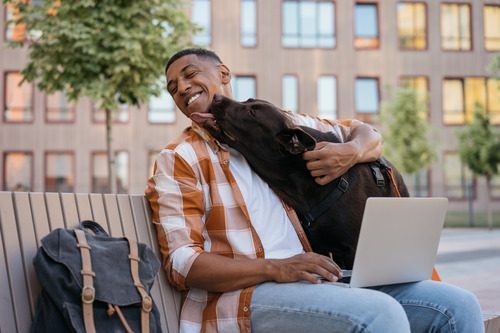Many dog owners ponder the question, “Why does my dog lick me so much?”. This is a very common behavior in dogs, and it can mean various things, from displaying affection to indicating potential health concerns. Understanding the reasons behind your dog’s licking habits is crucial for strengthening your relationship with your furry friend and ensuring their well-being. This article will delve into the numerous reasons why dogs engage in excessive licking, helping you interpret what your dog is trying to communicate about their emotional and physical state. For personalized advice or if you have concerns about your dog’s licking, please contact Lake City Animal Hospital at (386) 755-0236 or visit our website to schedule an appointment online.
 dog-licking-owner-who
dog-licking-owner-who
Expressing Affection and Strengthening Bonds
Dogs often lick as a fundamental way to show affection. This behavior is deeply rooted in their early puppyhood, where licking is a primary interaction between puppies, their mothers, and littermates. It’s a learned behavior that translates into expressing love, respect, and even submission towards their human families. When your dog licks you frequently, they are likely mimicking the nurturing and bonding behaviors they experienced as a puppy. This act is a significant way for them to reinforce your bond and communicate that they care for you deeply, considering you a vital part of their social group.
A Key Communication Tool
Licking serves as an important communication tool for dogs, allowing them to express a variety of needs and desires. Just as barking or whining can signal specific needs, licking can be a way for your dog to communicate hunger, a desire for attention, or an invitation to play. By carefully observing the context of when and where your dog licks you, you can gain valuable insights into what they are attempting to tell you. For instance, licking your hands might be a gentle nudge for attention, while licking your face could be a sign of excitement or hunger, especially if it occurs around meal times. Paying attention to these cues ensures you can respond appropriately and meet your dog’s needs promptly.
Managing Anxiety and Relieving Stress
Excessive licking in dogs can sometimes be a coping mechanism for anxiety and stress. Similar to how humans might engage in habits like nail-biting or hair-twirling when feeling nervous, dogs may turn to repetitive licking to soothe themselves. This behavior releases endorphins, which have a calming effect and can help alleviate anxiety in the short term. If you notice your dog’s licking becoming obsessive, compulsive, or occurring in stressful situations such as during thunderstorms or when left alone, it could be a sign of underlying anxiety. In such cases, seeking professional advice from a veterinarian or a certified canine behaviorist is recommended to address the root cause of the anxiety and find healthier coping strategies for your dog.
Medical Issues as a Potential Cause
It’s important to consider that changes in a dog’s licking behavior, particularly if it becomes excessive or focused on a specific area, can sometimes indicate an underlying medical issue. Allergies, skin infections, gastrointestinal problems, or even pain can cause discomfort, prompting a dog to lick excessively as a way to soothe the irritation or pain. Observing whether the licking is concentrated on a particular body part or is more generalized is crucial. Localized licking, for example, on paws or a specific spot on their body, might point to skin issues or localized pain. Generalized excessive licking, on the other hand, could be related to systemic issues. If you suspect a medical problem, consulting with a veterinarian is essential to diagnose and treat any underlying health conditions.
Exploring the World Through Taste and Scent
Dogs explore their environment using their senses of smell and taste in ways that are far more developed than in humans. Licking is part of this exploratory behavior. Your skin naturally contains salts, and any lotions, perfumes, or food residues you might have on your skin can be incredibly interesting to your dog’s heightened senses. This exploration through licking can sometimes be misinterpreted as excessive licking, when in fact, your dog is simply investigating intriguing scents and tastes on your skin. Understanding this aspect of canine behavior can help dog owners manage the licking by being mindful of what they apply to their skin and ensuring to wash hands after meals if they find their dog is particularly drawn to licking them after eating.
Habitual Behavior and Routine Comfort
For some dogs, licking can simply become a habitual behavior over time. If a dog has been licking since puppyhood and continues this behavior even when there are no apparent triggers like stress or communication needs, it might have developed into a comforting routine. This is especially true if the behavior has been inadvertently reinforced over time, for example, if the dog received attention every time they licked. While habitual licking might not always indicate a problem, it can become excessive and bothersome. Training and behavior modification techniques can be effective in managing and redirecting this habitual licking into more desirable behaviors. Consistent training and providing alternative comforting activities can help reduce habitual licking.
Responding Appropriately to Excessive Licking
Understanding the various reasons behind your dog’s licking behavior is the first step in responding effectively and fostering a better relationship with your pet. By observing the context, frequency, and intensity of the licking, you can begin to decipher what your dog is trying to communicate. If you are concerned about the amount or nature of your dog’s licking, especially if it seems sudden, excessive, or accompanied by other symptoms, it is always best to consult with veterinary professionals. Contact Lake City Animal Hospital at (386) 755-0236 or book an appointment online to ensure your dog’s health and well-being is properly assessed. Recognizing and appropriately addressing your dog’s licking habits will lead to more enjoyable and stress-free interactions for both you and your canine companion.